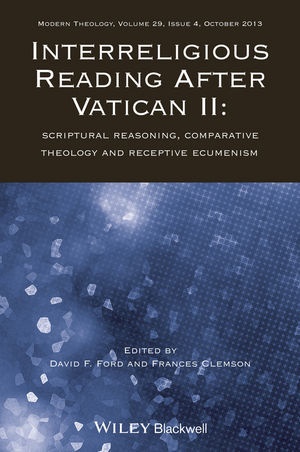Ulteriori informazioni
Interreligious Reading After Vatican II brings together for the first time leading scholars from within and outside the Catholic tradition to discuss and undertake interreligious reading in the light of Vatican II.
* Focuses on Scriptural Reasoning and Comparative Theology, and considers the relationship between interreligious engagement and Receptive Ecumenism within the Church
* Details key events in the history of forms of study across faith traditions
* Offers a fresh analysis of the impact and on-going legacy of the Second Vatican Council
* Tackles questions about scripture, doctrine, tradition, philosophy and ecumenism in connection with theories and practices of interreligious reading and reasoning
* Inspires readers to think about how to engage with others within and beyond their own religious tradition
Sommario
Introduction - Interreligious Reading After Vatican II: Scriptural Reasoning, Comparative Theology and Receptive Ecumenism (David F. Ford)
1. Opening up a Dialogue: Dei Verbum and the Religions (Michael Barnes, SJ)
2. Deep Reasonings: Sources Chretiennes, Ressourcement, and the Logic of Scripture in the years before - and after - Vatican II (Kevin L. Hughes)
3. Catholic Reasoning and Reading Across Traditions (David Dault)
4. An Analogical Reading of Christian Prophecy: The Case of Muhammad (Anna Bonta Moreland)
5. Families of Receptive Theological Learning: Scriptural Reasoning, Comparative Theology, and Receptive Ecumenism (Paul D. Murray)
6. Scriptural Reasoning and the Legacy of Vatican II: Their Mutual Engagement and Significance (David F. Ford)
7. Scriptural Reasoning and the Discipline of Christian Doctrine (Mike Higton)
8. Interreligious Reading in the Context of Dialogue: When Interreligious Reading "Fails" (Tracy Sayuki Tiemeier)
9. Long-Term Disagreement: Philosophical Models in Scriptural Reasoning and Receptive Ecumenism (Nicholas Adams)
10. In the Balance: Interior and Shared Acts of Reading (Francis X. Clooney, SJ)
11. A Good Word is a Good Tree: A Muslim Response to the Interfaith Challenges of Vatican II (Maria Massi Dakake)
12. Re-socializing Scholars of Religious, Theological, and Theo-Philosophical Inquiry (Peter Ochs)
Index
Notes on contributors
Info autore
David F. Ford is Regius Professor of Divinity at the University of Cambridge and Director of the Cambridge Inter-faith Programme. His publications include
The Future of Christian Theology (Wiley-Blackwell, 2011),
Christian Wisdom: Desiring God and Learning in Love (Cambridge University Press, 2007), and
Shaping Theology: Engagements in a Religious and Secular World (Wiley-Blackwell, 2007).
Frances Clemson is Research Associate in the Faculty of Divinity at the University of Cambridge and works within the Cambridge Inter-faith Programme.
Riassunto
Interreligious Reading After Vatican II brings together for the first time leading scholars from within and outside the Catholic tradition to discuss and undertake interreligious reading in the light of Vatican II.
Relazione
"Based in both theory and a wealth of practical experience, thiscollection of essays is valuable to scholars and veterans ofinterreligious reading, especially those who might be looking tolearn more about the specific disciplines of Comparative Theology,Scriptural Reasoning and Receptive Ecumenism." ( Touchstone , 1 June 2014)

